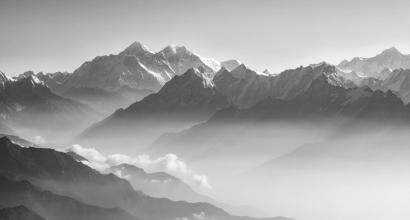How can there be adharma for one established in the origin of dharma? For such a person, there is no other object or being than Brahma. Whence pāpa for him? The ocean wipes out the many colours, tastes, and characteristics of the waters of the rivers that meet it - merging them all together into an indivisible oneness. The ocean of Brahma similarly extinguishes the individual characteristics of those who take refuge in it, transforming them into an indivisible unity.
The rasa of Brahma is an adhi-rasa (a rasa beyond worldly rasas) that harmonises every rasa, anti-rasa or non-rasa. It transforms stone to sugar; and iron to gold. The defects of the one absorbed in Brahma are already dissolved.
jñānāgniḥ sarvakarmāṇi bhasmasātkurute tathā ||
BG 4.37
The śruti counsels the same. The Taittirīya Upaniṣad says this.
ānandaṃ brahmaṇo vidvān| na bibheti kutaścaneti | etaṃ ha vāva na tapati
kimahaṃ sādhu nākaravam | kimahaṃ pāpamakaravamiti |
sa ya evaṃ vidvānete ātmānaṃ spṛṇute |ubhe hyevaiṣa ete ātmānaṃ spṛṇute |Taittirīya Up 2.9.1
He who has experienced the bliss of Brahma fears nothing. He does not fret - “Alas! I did not perform any good deeds!” or “Alas! I performed this evil deed!” - anxiously. He who knows the nature of Brahma keeps himself in good cheer. Entrusting both puṇya and pāpa to Brahma, the origin of all the jīvas, he enjoys self-contentment.
This is the state of one in adhi-dharma. Whatever he does - even if considered as a pāpa from the view of the world or the śāstras - is not truly a pāpa for him, for he who is established in Brahma has neither the seed of pāpa nor selfish thoughts and desires in him. He sees the Universal Self everywhere and therefore his acts are directed towards general welfare, not otherwise.
yasya nāhaṅkṛto bhāvo buddhiryasya na lipyate |
hatvāpi sa imāl-lokān-na hanti na nibadhyate ||BG 18.17
The dhārmic person, subject to vaidika rules or his guru’s orders, societal traditions or other external factors, walks the path of the good either out of fear or desire.
However, the one established in adhi-dharma follows the path of the good without any such fears or restrictions or expectation of rewards because of the practice of seeing his own Self everywhere. He works for the welfare of the world without the need of a prescription or proscription.
The knower of the Self is mentioned in the third chapter on Karma Yoga.
yastvātmaratireva syād-ātma-tṛptaśca mānavaḥ.
ātmanyeva ca santuṣṭas-tasya kāryam na vidyate৷৷BG 3.17
Here, kārya refers to obligatory activity - something that has to be done because of external restrictions. “kāryam na vidyate” - refers to some activity that has become imperative either because it has been mandated by someone else or because of a fear of punishment, or due to an expectation of benefit. As the knower of the Self is a personification of benevolence and has no ego, whatever he does is independent activity that results in nothing other than universal well-being. He is free to do something or not to do it. Whatever he does or does not do is not from an egoistic perspective but from that of the Universal Self.
Such a person is described by the śāstras as an atyāśrami (one who is beyond all the āśramas) or an avadhūta (one who has cast off everything).
yo vilaṅghyā’’śramān varṇān ātmanyeva sthitassadā ।
ativarṇāśramī yogī avadhūtassa ucyate ॥Avadhūtopaniṣat 3
(The yogi who has gone beyond the āśramas and varṇas and is established in his Self, is known as an ati-varṇāśramī and an avadhūta)
Another verse is as follows.
tyaja dharmamadharmaṃ ca tyaja satyānṛte ubhe ।
ubhe satyānṛte tyaktvā yena tyajasi tattyaja ॥Sannyāsopaniṣat 2.12
“Give up dharma - of the form of external rules and injunctions - that is mandated by the śāstras; give up adharma too. Give up the practice of speaking truth as well as untruth. Consider these opposites as mere modifications of name and form in creation and escape from them. Go beyond opposites by the constant remembrance of the līlās of Brahma. Finally, renounce the notion of “I” through which you renounced all this.”
Renunciation is also an activity. Any activity has a doer. It is the notion of doership that is ego. Even that should be dissolved! The “I” should cease to exist.
jñānāmṛtena tṛptasya kṛtakṛtyasya yoginaḥ ।
naivāsti kiñcit-kartavyam asti cenna sa tattvavit ॥Jābāladarśanopaniṣad 1.23
(There is no obligatory duty for the Yogi satisfied with the nectar of knowledge, who has accomplished what needs to be done. If he thinks that he has obligatory duty, he does not know the truth)
All restrictions of dharma are prerequisites to the knowledge of Brahma. What was an obligation before the dawn of Brahma-knowledge becomes a joyous pastime after it.
vyavahāro laukiko vā śāstrīyo vā’nyathāpi vā।
mamākarturalepasya yathārabdhaṃ pravartatām॥
athavā kṛtakṛtyo’pi lokānugrahakāmyayā।
śāstrīyeṇaiva mārgeṇa varte’haṃ mama kā kṣatiḥ ॥Avadhūtopanīṣad 24,25
(For me, who is not the doer and who is unattached,
may activity - worldly or śāstrīya or something else - continue as it was started.
Or, even though I have done whatever has to be done,
I can work in the path ordained by the śāstras for the welfare of the world.
What harm can come to me?)
An ancient stotra known as the śukāṣṭakam enumerates these marks of an avadhūta:
bhedābhedau sapadi galitau puṇyapāpe viśīrṇe
māyāmohau kṣayamupagatau naṣṭasandehavṛtteḥ ।
śabdātītaṃ triguṇarahitaṃ prāpya tattvāvabodhaṃ
nistraiguṇye pathi vicarataḥ ko vidhiḥ ko niṣedhaḥ ॥(Difference and non-difference have vanished in a flash. Pāpa and puṇya are gone.
With doubt destroyed, delusion and infatuation have dwindled away.
I have reached the truth that is beyond speech and devoid of the three guṇas,
For me who travels on the path beyond the three guṇas, whence rules? Whither prohibition?)
Ordained by the Vedas and śāstras, obligatory dharmas have defined results. Rituals such as yajñas have svarga and others as their fruit. We have seen so far on many an occasion that activity performed sans desire for personal benefit is the nature of a knower of the supreme principle. “trai-guṇya-viṣayā vedā nis-traiguṇyo bhavārjuna” - is the supreme goal. “Arjuna, if you are devoid of selfish thoughts and only the feeling of universal selfhood resides in you, perform activity for the welfare of the world without regard for results, considering it as the worship of paramātmā. Be established in the welfare of all beings like an avadhūta who is beyond all varṇas and āśramas, unfettered by śāstric rules, and is completely free.” This is another kind of adhidharma.
To surrender to Bhagavān - fully and only to Bhagavān - is adhidharma. That indeed is the pinnacle of bhakti and jñāna.
Let us look at the distinctions between dharma and adhidharma.
External testimony such as extracts from the śāstras and traditions from the guru are needed to decide upon the right course of dharma. However, these are not needed for adhidharma as it proceeds independently from internal śraddhā and direct experience of the supreme truth.
All worldly works have two stations for manifesting results. The first is the doer; the next is the world that exists with him. The fruits of the works too are divided between them. There is no such division in adhidharma. The fruit of dharma is enjoyed by both the doer and those who come in contact with him. As the one established in adhidharma is devoid of ego, there is no personal fruit of action; but the world gets the benefit of that work.
Defects in a dharmi’s activity are proportional to the ego present during its performance. As an adhidharmi is egoless and possesses only the guṇa of sattva, there is no defect in his performance; only goodness. Adhidharma is the independent expression of pure sattva.
Adhidharma in the form of surrender is of two kinds. One is self-surrender. The other is universal self-hood.
1. Surrender of the self is the state of perfection of bhakti; its apex. It is unalloyed śraddhā; one that needs no reasoning. It does not require external validation through proofs and testimonies. A child does not wait for another’s words or direction to trust its mother; it just relaxes in her lap, forgetting itself. In the same way, a bhakta placing trust in Bhagavān appeals to him - “Svāmin! You are my everything! Your will is my will” - and rejoices after dissolving his “I”-ness into Bhagavān. This is self-surrender where his “I” merges into Bhagavān. Such a dissolution of one’s ego is itself a kind of surrender. Just as outer measures are not needed to certify this inner transformation, outer rules and injunctions are not needed as well. Such a surrender knows nothing other than Bhagavān and is hence known as ekānta-bhakti (devotion towards only one ideal).
Hear the prayer of one such devotee.
tvayi janārdana bhaktir-acañcalā yadi bhavedaphalapravaṇā mama
abhilaṣāmy-apavargaparāṅmukhaḥ punarapīha śarīraparigraham ॥
“Bhagavān! If I truly have firm and desireless bhakti in you, I will desire for a human body without any aspiration towards mokṣa.”
Bhakti is a mode of the heart that does not wait for confirmation from logical analyses. Just as the ocean rises along with the full moon, the devotee’s heart swells when he remembers Bhagavān. As he is egoless, his infatuation and sorrow too disappear leaving him with peace and bliss beyond compare.
To be continued...
The present series is a modern English translation of DVG’s Kendra Sahitya Akademi Award-winning work, Bhagavad-gītā-tātparya or Jīvana-dharma-yoga. The translators wish to express their thanks to Śatāvadhāni R Ganesh for his valuable feedback and to Hari Ravikumar for his astute edits.











































